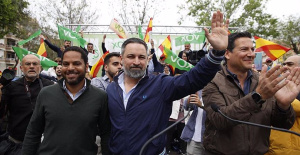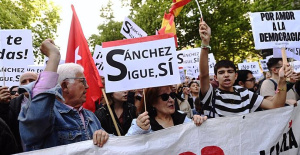The conservative majority of the TC also speaks of excessive tension: "It is endangering the institutions"
MADRID, 9 Dic. (EUROPA PRESS) -
The amendment introduced this Friday by the PSOE and Unidas Podemos (UP) to change the election process of the two candidates for the Constitutional Court (TC) that is the responsibility of the General Council of the Judiciary (CGPJ) when it is not done within the deadline has deepened the already existing divisions in the conservative and progressive sectors of both institutions, since the former --majority-- see it as a form of pressure and the latter as a solution to the current blockade.
The government partners propose going from a three-fifths majority to a simple one so that the CGPJ designates its two candidates for the TC and that, in the event that the governing body of the judges continues to fail, their members can be held accountable even penalties.
According to the sources consulted by Europa Press, the conservative block of the CGPJ believes that it is a "devastating interference", a "blackmail" and even a threat whose objective is not so much to guarantee that the Council appoints its two candidates for the TC as that the nominee for the progressive sector be admitted: the magistrate of the Supreme Court (TS) José Manuel Bandrés.
From the conservative wing they call attention to the fact that the reform contemplates that, instead of each of the 18 members proposing and voting for two candidates, they propose and vote for only one, which -as they explain- will guarantee that the two most voted are the aspirants of each block, in the case of the progressives, Bandrés.
The negotiations within the CGPJ reached a dead end last week after the progressive members ratified Bandrés' candidacy and offered to the conservatives to also accept without objection the candidate they designated. But the conservatives rejected that system, insisting that both candidates must be chosen jointly.
Thus, the conservative block of the CGPJ has met this Friday to study the possibility of requesting the interim president, Rafael Mozo, to convene an extraordinary plenary session to vote for the two TC candidates before the aforementioned reform is approved and go into effect.
However, from the progressive current they believe that the proposal of PSOE and UP is a legitimate way for the Cortes Generales to offer a solution to the current blockade. In his opinion, the "shameful" thing would be that "nobody did anything" to try to remove the obstacles that prevent the normal functioning of the institutions.
In addition, from the progressive sector it is understood that "reasonable" right now would even wait to hold any vote in the CGPJ on the two candidates for the TC for the reform to become a reality.
In this way, the progressive members open the door to postpone the vote scheduled for the ordinary plenary session on December 22, the first that was to be carried out on the duo for the Constitutional.
In his opinion, if the conservative bloc was in no "hurry" to comply with this constitutional obligation, now there is no reason to speed up, and even less so when representatives and senators are expected to change the voting rules.
On the other hand, the amendments presented propose that, if after the 9 years and 3 months of the mandate of the four magistrates of the TC proposed by the CGPJ (two) and by the Government (two), the two candidates who have proposed even if the other two are missing, and that without the need for the 'placet' of the Constitutional Plenary.
With these changes, the Government circumvents all the obstacles to be able to name its two candidates for the TC, the former minister Juan Carlos Campo and the former adviser to Moncloa Laura Díez, without waiting for the CGPJ to fulfill its part and without risking that the current conservative majority of the Constitutional stop their landing in the court of guarantees without the two of the CGPJ.
In the conservative block of the TC they believe that this reform supposes "force" and generates "distortions" in the usual operation. "It is endangering the institutions," summarize the sources consulted.
Likewise, they underline that, although with these amendments the laws that govern the CGPJ and the TC could be reformed, the Constitution continues to establish that the renewal must be produced by third parties, for which reason they warn that, if they are appealed, their fit should be assessed in the Magna Carta.
In the opposite sense, the progressive wing of the TC welcomes the proposed reform. In his opinion, Parliament is, precisely, to offer solutions to what they estimate was already a "double boycott" --of the conservative majorities in CGPJ and Constitutional-- to indefinitely block the renewal of the TC.

 Exploring Cardano: Inner Workings and Advantages of this Cryptocurrency
Exploring Cardano: Inner Workings and Advantages of this Cryptocurrency Seville.- Economy.- Innova.- STSA inaugurates its new painting and sealing hangar in San Pablo, for 18 million
Seville.- Economy.- Innova.- STSA inaugurates its new painting and sealing hangar in San Pablo, for 18 million Innova.- More than 300 volunteers join the Andalucía Compromiso Digital network in one month to facilitate access to ICT
Innova.- More than 300 volunteers join the Andalucía Compromiso Digital network in one month to facilitate access to ICT Innova.-AMP.- Ayesa acquires 51% of Sadiel, which will create new technological engineering products and expand markets
Innova.-AMP.- Ayesa acquires 51% of Sadiel, which will create new technological engineering products and expand markets Abascal (Vox) criticizes that Sánchez is "victimizing" himself and calls for elections after his possible resignation
Abascal (Vox) criticizes that Sánchez is "victimizing" himself and calls for elections after his possible resignation Carlos Alcaraz reaches the round of 16 in Madrid without breaking a sweat
Carlos Alcaraz reaches the round of 16 in Madrid without breaking a sweat Some 5,000 people demonstrate in front of Congress for democracy, hours before Sánchez's decision
Some 5,000 people demonstrate in front of Congress for democracy, hours before Sánchez's decision STATEMENT: Intelligent systems used in the construction of the deepest underwater tunnel in China
STATEMENT: Intelligent systems used in the construction of the deepest underwater tunnel in China How Blockchain in being used to shape the future
How Blockchain in being used to shape the future Not just BTC and ETH: Here Are Some More Interesting Coins Worth Focusing on
Not just BTC and ETH: Here Are Some More Interesting Coins Worth Focusing on UPV students build a prototype of a wooden house to move to Equatorial Guinea
UPV students build a prototype of a wooden house to move to Equatorial Guinea The UA opens the call for the Impulso 2024 Awards for the best innovative business initiatives
The UA opens the call for the Impulso 2024 Awards for the best innovative business initiatives ALI, virtual assistant from Alicante, internationally recognized by the OECD
ALI, virtual assistant from Alicante, internationally recognized by the OECD Retrópolis brings the golden age of video games and computing to the UPV
Retrópolis brings the golden age of video games and computing to the UPV A million people demonstrate in France against Macron's pension reform
A million people demonstrate in France against Macron's pension reform Russia launches several missiles against "critical infrastructure" in the city of Zaporizhia
Russia launches several missiles against "critical infrastructure" in the city of Zaporizhia A "procession" remembers the dead of the Calabria shipwreck as bodies continue to wash up on the shore
A "procession" remembers the dead of the Calabria shipwreck as bodies continue to wash up on the shore Prison sentences handed down for three prominent Hong Kong pro-democracy activists
Prison sentences handed down for three prominent Hong Kong pro-democracy activists ETH continues to leave trading platforms, Ethereum balance on exchanges lowest in 3 years
ETH continues to leave trading platforms, Ethereum balance on exchanges lowest in 3 years Investors invest $450 million in Consensys, Ethereum incubator now valued at $7 billion
Investors invest $450 million in Consensys, Ethereum incubator now valued at $7 billion Alchemy Integrates Ethereum L2 Product Starknet to Enhance Web3 Scalability at a Price 100x Lower Than L1 Fees
Alchemy Integrates Ethereum L2 Product Starknet to Enhance Web3 Scalability at a Price 100x Lower Than L1 Fees Mining Report: Bitcoin's Electricity Consumption Declines by 25% in Q1 2022
Mining Report: Bitcoin's Electricity Consumption Declines by 25% in Q1 2022 Oil-to-Bitcoin Mining Firm Crusoe Energy Systems Raised $505 Million
Oil-to-Bitcoin Mining Firm Crusoe Energy Systems Raised $505 Million Microbt reveals the latest Bitcoin mining rigs -- Machines produce up to 126 TH/s with custom 5nm chip design
Microbt reveals the latest Bitcoin mining rigs -- Machines produce up to 126 TH/s with custom 5nm chip design Bitcoin's Mining Difficulty Hits a Lifetime High, With More Than 90% of BTC Supply Issued
Bitcoin's Mining Difficulty Hits a Lifetime High, With More Than 90% of BTC Supply Issued The Biggest Movers are Near, EOS, and RUNE during Friday's Selloff
The Biggest Movers are Near, EOS, and RUNE during Friday's Selloff Global Markets Spooked by a Hawkish Fed and Covid, Stocks and Crypto Gain After Musk Buys Twitter
Global Markets Spooked by a Hawkish Fed and Covid, Stocks and Crypto Gain After Musk Buys Twitter Bitso to offset carbon emissions from the Trading Platform's ERC20, ETH, and BTC Transactions
Bitso to offset carbon emissions from the Trading Platform's ERC20, ETH, and BTC Transactions Draftkings Announces 2022 College Hoops NFT Selection for March Madness
Draftkings Announces 2022 College Hoops NFT Selection for March Madness























